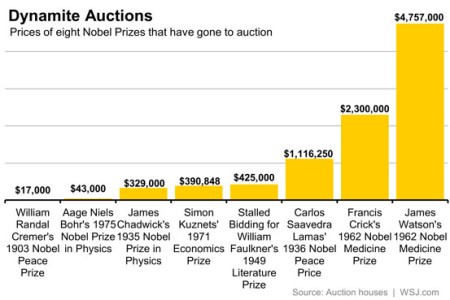Can you believe it: the first Nobel prize in economics was sold at auction last week? Like the science, peace and literature prizes, the economics prize is awarded for making an important advance in human understanding or harmony. But when you look at the list of economics winners, you may wonder whether there has been any winning economist who deserves that accolade (Milton Friedman, Gary Becker, Robert Lucas, Eugene Fama). Some of them have actually set economics back, not forward. Maybe it is not accident that the economics prize is not funded or chosen by Norway’s Nobel Foundation but by the Swedish Riksbank, the central bank.
But then if you look at some of the winners of Peace prize, things are not much better (Henry Kissinger, Menachim Begin, Mother Teresa, FW de Klerk, Shimon Peres, Barack Obama (after less than one year), and the European Union (?)).
Anyway, last week, the first Nobel Prize in economics to go for auction sold for $390,848. That’s more than for prizes in physics, but far from the million-plus payouts for prizes for medicine or peace.

It was the prize awarded Simon Kuznets in 1971 that sold. Kuznets is known as the author of the gross domestic product measurement that now serves as the key benchmark for the size and growth of economies worldwide. He’s also famous for the Kuznets Curve, which suggests that as a country’s level of economic development increases, inequality initially rises but then falls. This latter conclusion has been disputed by Thomas Piketty and others in their recent works (see my post, https://thenextrecession.wordpress.com/2011/10/21/1-versus-99/).
The price for the Kuznets prize was nowhere near that of Francis Crick and James Watson‘s Nobels, which sold in 2013 and 2014 for millions each. Their discovery of the double-helix structure of DNA puts them among the most famous scientists of the century.

Why the difference in price for these prizes at auction: the intrinsic value of the medal?; supply and demand?; inflation?. I leave that for any of these eminent economists to tell us:
No comments:
Post a Comment